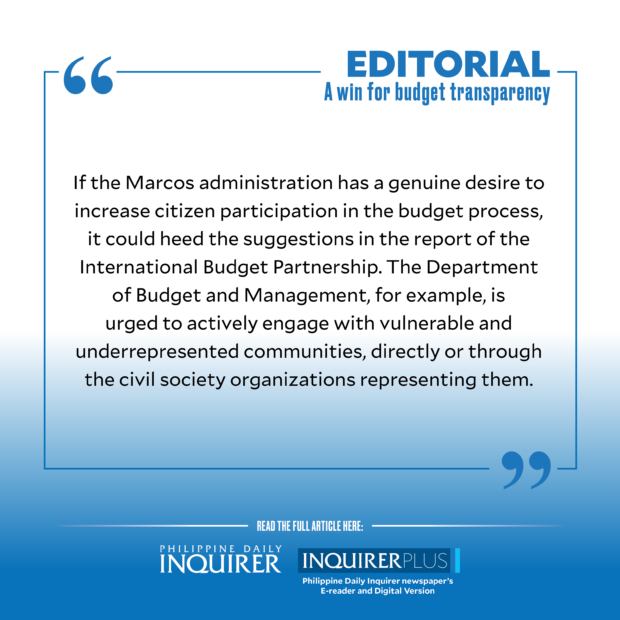A win for budget transparency

For actively involving the different branches of government as well as civil society and the general public in the formulation, approval, and monitoring of the national budget, the Philippines was ranked the “most fiscally transparent country” in Asia and 15th among 125 countries.
According to United States-based International Budget Partnership’s (IBP) closely watched 2023 Open Budget Survey (OBS)—which assesses public access to central government budget information; formal opportunities for the public to participate in the national budget process; and the role of budget oversight institutions—the Philippines scored 75 out of 100 for transparency.
The Philippines’ high score exceeded the global average of 45 and an improvement by seven points from the previous survey in 2021, thanks mainly to the release of the mid-year budget review online to be freely available to the public.
Article continues after this advertisementThis step helped put the Philippines far above 61, the minimum level that indicates that a country releases enough information for the public to keep abreast of the national budget which spells out a government’s spending priorities to achieve its short- to medium-term development goals.
Good governance
The Department of Budget and Management (DBM) also pointed out that the score in the 2023 survey beat the government’s own target level of 71 under the Marcos administration’s Philippine Development Plan 2023-2028.
Budget Secretary Amenah F. Pangandaman, who steered the approval of the P5.768-trillion budget for 2024, declared that the high score was “solid proof” that the Marcos administration “works for and with the people to promote good governance in the country.”
Article continues after this advertisementThe Philippines has indeed come a long way from a low of 48 in 2012 and the DBM deserves credit for putting in years of reform in the budget process.
Nevertheless, that does not mean that all is fine and dandy with the national budget.
The survey showed, for instance, that the Philippines scored particularly high on budget oversight at 83 out of 100, meaning that the supervision of both the legislative branch and the Commission on Audit on the budget process was deemed more than adequate.
Unforeseen expenditures
The Philippines was in fact ranked sixth in the world on this parameter, next to Norway, the Czech Republic, South Korea, Brazil, and Georgia.
And yet there are grave concerns raised by minority lawmakers, for example, on how and why unprogrammed funds in the 2024 General Appropriations Act were hiked to P731.4 billion from P281.9 billion after the bicameral conference.
The DBM had said that these funds were merely “standby appropriations” for the Marcos administration “to address unforeseen expenditures and prioritize essential programs and projects.” However, there are fears that these can give rise to corruption since the use of these funds is not spelled out, thus accountability is not clearly defined.
That the hike in unprogrammed funds had gone through despite valid concerns can be attributed to the lack of opportunities for the Filipino public to have a “meaningful participation in the different stages of the budget process.”
This lack of adequate avenues for engagement in the lengthy budget process is reflected in the low 33 out of 100 score for public participation in the survey.
Citizen participation
The score may have beaten the global average of 15 and still enough to keep the lead in Southeast Asia, even ranking 13th worldwide, but it is still a black mark for genuine transparency and good governance, especially as the Filipino taxpayers should have their say in how the budget is allocated and later disbursed.
If the Marcos administration has a genuine desire to increase citizen participation in the budget process, it could heed the suggestions in the report of the IBP. The DBM, for example, is urged to actively engage with vulnerable and underrepresented communities, directly or through the civil society organizations representing them.
Negative public opinion
Doing so will better protect the budget process from questionable insertions such as the confidential funds that some agencies inexplicably wanted for themselves. Legislators were forced by negative public opinion to realign these funds, but it didn’t need to get that far if there were more genuine opportunities for the public to participate in the early part of the budget process.
Going through these additional proposed steps may indeed seem tedious and cumbersome and thus extend the already lengthy budget approval process.
But the benefits of increased participation by stakeholders should outweigh consequences in terms of additional time, effort, and resources.
As the IBP underscored, when governments provide information and meaningful channels for the public to engage in decisions on what taxes to impose, what services to provide, and how much debt to take on, the people can be better assured that public money is spent as it should be instead of wasted or, worse, pocketed.
















